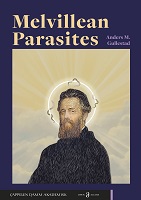Melvillean Parasites
Author(s)
Gullestad, Anders Marcussen
Language
EnglishAbstract
Melvillean Parasites addresses an aspect of Herman Melville’s authorship largely overlooked by previous scholars: the abundance of narrators and characters in his writings in search of food—an aim they typically pursue through sponging off the people they encounter.
Deploying the conceptual figure of the parasite as its primary analytical tool, the book interprets how the dream of a free meal plays out and is given literary form in Typee (1846), “Bartleby, the Scrivener” (1853), “Jimmy Rose” (1855), and The Confidence-Man (1857). In so doing, Melvillean Parasites aims to explain how Melville’s engagement with ethico-political issues concerning nourishment, dependency upon others, hospitality, and responsibility toward strangers, evolved and changed over time. Compared to the tendency of dehumanizing the parasite found in many of his contemporaries, the book claims that what sets him apart, is his insight into the unavoidable parasitic tendencies of us all: Herman Melville—patron saint of the parasite.
Melvillean Parasites is intended for scholars, students, and general readers with an interest in the concept of the parasite, as well as Herman Melville’s authorship, American literature, and 19th century studies in general.
Anders M. Gullestad is Associate Professor at the Department of Linguistic, Literary and Aesthetic Studies at the University of Bergen.
Keywords
Herman Melville, Michel Serres, parasite, parasitism, parasitology, food, spongingDOI
10.23865/noasp.174ISBN
9788202785581, 9788202785598, 9788202785604, 9788202755430Publisher website
https://www.cappelendamm.no/Publication date and place
Oslo, 2022Classification
Literary studies: fiction, novelists and prose writers
Microbiology (non-medical)


 Download
Download Web Shop
Web Shop